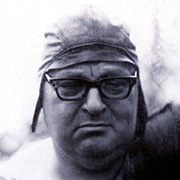- Blurred
- Aug 26, 2004
-

WELL I WONNER WHAT IT'S LIIIIIKE TO BE A GOOD POSTER
|
Good Reviews of Bad Books:
One of my guilty pleasures is witnessing a skilled reviewer take a mediocre product and just publicly eviscerate it. I don't know why: there's just something very cathartic about it.
When talking about book reviews, the best example I have is Matt Taibbi's takedowns of NY Times columnist Thomas Friedman, whose books he aptly describes as "middle-brow horseshit". If you want a primer in how to expose bad writing and vacuous thought, these reviews are the best place to start. Take, for example, his review of "Hot Flat and Crowded" (which I post in full here because I can't find a properly formatted version anywhere):
quote:When some time ago a friend of mine told me that Thomas Friedman's new book, Hot, Flat, and Crowded, was going to be a kind of environmentalist clarion call against American consumerism, I almost died laughing. Beautiful, I thought. Just when you begin to lose faith in America's ability to fall for absolutely anything - just when you begin to think we Americans as a race might finally outgrow the lovable credulousness that leads us to fork over our credit card numbers to every half-baked TV pitchman hawking a magic dick-enlarging pill, or a way to make millions on the Internet while sitting at home and pounding doughnuts - along comes Thomas Friedman, porn-stached resident of a positively obscene 114,000 square foot suburban Maryland mega-monstro-mansion and husband to the heir of one of the largest shopping-mall chains in the world, reinventing himself as an oracle of anti-consumerist conservationism.
Where does a man who needs his own offshore drilling platform just to keep the east wing of his house heated get the balls to write a book chiding America for driving energy inefficient automobiles? Where does a guy whose family bulldozed 2.1 million square feet of pristine Hawaiian wilderness to put a Gap, an Old Navy, a Sears, an Abercrombie and even a motherfucking Foot Locker in paradise get off preaching to the rest of us about the need for a "Green Revolution"? Well, he'll explain it all to you in 438 crisply written pages for just $27.95, $30.95 if you have the misfortune to be Canadian.
I've been unhealthily obsessed with Thomas Friedman for more than a decade now. For most of that time, I just thought he was funny. And admittedly, what I thought was funniest about him was the kind of stuff that only another writer would really care about - in particular his tortured use of the English language. Like George W. Bush with his Bushisms, Friedman came up with lines so hilarious you couldn't make them up even if you were trying - and when you tried to actually picture the "illustrative" figures of speech he offered to explain himself, what you often ended up with was pure physical comedy of the Buster Keaton/Three Stooges school, with whole nations and peoples slipping and falling on the misplaced banana peels of his literary endeavors.
Remember Friedman's take on Bush's Iraq policy? "It's OK to throw out your steering wheel," he wrote, "as long as you remember you're driving without one." Picture that for a minute. Or how about Friedman's analysis of America's foreign policy outlook last May: "The first rule of holes is when you're in one, stop digging.When you're in three, bring a lot of shovels." First of all, how can any single person be in three holes at once? Secondly, what the gently caress is he talking about? If you're supposed to stop digging when you're in one hole, why should you dig more in three? How does that even begin to make sense? It's stuff like this that makes me wonder if the editors over at the New York Times editorial page spend their afternoons dropping acid or drinking rubbing alcohol. Sending a line like that into print is the journalism equivalent of a security guard at a nuke plant waving a pair of mullahs in explosive vests through the front gate. It should never, ever happen.
Even better was this gem from one of Friedman's latest columns:
"The fighting, death and destruction in Gaza is painful to watch. But it's all too familiar. It's the latest version of the longest-running play in the modern Middle East, which, if I were to give it a title, would be called: 'Who owns this hotel? Can the Jews have a room? And shouldn't we blow up the bar and replace it with a mosque?' "
There are many serious questions one could ask about this passage, but the one that leaped out at me was this: In the "title" of that long-running play, is it supposed to be the same person asking all three of those questions? If so, does that person suffer from multiple personality disorder? Because in the first question, he is a neutral/ignorant observer of the Mideast drama; in the second he sympathizes with the Jews; in the third he's a radical Muslim. Moreover, after you blow up the bar and replace it with a mosque, is the surrounding hotel still there? Why would anyone build a mosque in a half-blown-up hotel? Perhaps Friedman should have written the passage like this: "It's the latest version of the longest-running play in the modern Middle East, which, if I were to give it a title, would be called: "Who owns this hotel? And why did a person suffering from multiple personality disorder build a mosque inside it after blowing up the bar and asking if there was a room for the Jews? Why? Because his editor's been drinking rubbing alcohol!"
OK, so maybe all of this is unfair.There are a lot of people out there who think Friedman has not been treated fairly by critics like me, that focusing on his literary struggles is a snobbish, below-the-belt tactic - a cheap shot that belies the strength of his overall "arguments." Who cares, these people say, if Friedman's book The World is Flat should probably have been titled The World is Round if he had wanted the book's title to match its "point" about living in an age of increased global interconnectedness? And who cares if it doesn't quite make sense when Friedman says that Iraq is like a "vase we broke in order to get rid of the rancid water inside?" Who cares that you can just pour water out of a vase, that only a loving lunatic breaks a perfectly good vase just to empty it of water? You're missing the point, folks say, and the point is all in Friedman's highly nuanced ideas about world politics and the economy - if you could just get past his well-meaning attempts to explain himself, you'd see that, and maybe you'd even learn something. My initial answer to that is that Friedman's language choices over the years have been highly revealing: when a man who thinks you need to break a vase to get the water out of it starts arguing that you need to invade a country in order to change the minds of its people, you might want to start paying attention to how his approach to the vase problem worked out.Thomas Friedman is not a president, a pope, a general on the field of battle or any other kind of man of action. He doesn't actually do anything apart from talk about poo poo in a newspaper. So in my mind it's highly relevant if his manner of speaking is hosed.
But whatever, let's concede the point, forget about the crazy metaphors for a moment, and look at the actual content of Hot, Flat and Crowded. Many people have rightly seen this new greenish pseudo-progressive tract as an ideological departure from Friedman's previous works, which were all virtually identical exercises in bald greed-worship and capitalist tent-pitching. Approach-and-rhetoric wise, however, it's the same old Friedman, a tireless social scientist whose research methods mainly include lunching, reading road signs, and watching people board airplanes. Like The World is Flat, a book borne of Friedman's stirring experience of seeing IBM sign in the distance while golfing in Bangalore, Hot, Flat and Crowded is a book whose great insights come when Friedman golfs (on global warming allowing him more winter golf days: "I will still take advantage of it - but I no longer think of it as something I got for free"), looks at Burger King signs (upon seeing a "nightmarish neon blur" of KFC, BK and McDonald's signs in Texas, he realizes: "We're on a fool's errand"), and reads bumper stickers (the "Osama Loves your SUV" sticker he read turns into the thesis of his "Fill 'er up with Dictators" chapter). This is Friedman's life: he flies around the world, eats pricey lunches with other rich people and draws conclusions about the future of humanity by looking out his hotel window and counting the Applebee's signs. Friedman frequently uses a rhetorical technique that goes something like this: "I was in Dubai with the general counsel of BP last year, watching 500 Balinese textile workers get on a train, when suddenly I said to myself, 'We need better headlights for ourtri-plane.'" And off he goes. You, the reader, end up spending so much time wondering what Dubai, BP and all those Balinese workers have to do with the rest of the story that you don't notice that tri-planes don't have headlights. And by the time you get all that sorted out, your well-lit tri-plane is flying from chapter to chapter delivering a million geo-green pizzas to a million Noahs on a million Arks. And you give up. There's so much poo poo flying around the book's atmosphere that you don't notice the only action is Friedman talking to himself.
In The World is Flat, the key action scene of the book comes when Friedman experiences his pseudo-epiphany about the Flat world while talking with himself in front of InfoSys CEO Nandan Nilekani. In Hot, Flat and Crowded, the money shot comes when Friedman starts doodling on a napkin over lunch with Moisés Naím, editor of Foreign Policy magazine. The pre-lunching Friedman starts drawing, and the wisdom just comes pouring out:
"I laid out my napkin and drew a graph showing how there seemed to be a rough correlation between the price of oil, between 1975 and 2005, and the pace of freedom in oil-producing states during those same years."
Friedman then draws his napkin-graph, and much to the pundit's surprise, it turns out that there is almost an exact correlation between high oil prices and "unfreedom"! The graph contains two lines, one showing arising and then descending slope of "freedom," and one showing a descending and then rising course of oil prices. Friedman plots exactly four points on the graph over the course of those 30 years. In 1989, as oil prices are falling, Friedman writes, "Berlin Wall Torn Down." In 1993, again as oil prices are low, he writes, "Nigeria Privatizes First Oil Field." 1997, oil prices still low, "Iran Calls for Dialogue of Civilizations." Then, finally, 2005, a year of high oil prices: "Iran calls for Israel's destruction." Take a look for yourself: I looked at this and thought: "Gosh, what a neat trick!" Then I sat down and drew up my own graph, called SIZE OF VALERIE BERTINELLI'S rear end, 1985-2008, vs. HAPPINESS. It turns out that there is an almost exact correlation! Note the four points on the graph: 1990: Release of Miller's Crossing; 1996-97: Crabs; 2001: Ate bad tuna fish sandwich at Times Square Blimpie, felt sick; 2008: Barack Obama elected. That was so much fun, I drew another one! This one is called AMERICAN PORKBELLY PRICES vs. WHAT MIDGETS THINK ABOUT AUSTRALIA 1972-2002. Or how about this one, called NUMBER OF ONE- EYED RETARDED FLIES IN THE STATE OF NORTH CAROLINA vs. LIKELIHOOD OF NUCLEAR COMBAT ON INDIAN SUBCONTINENT. Obviously this sounds like a flippant analysis, but that's more or less exactly what Friedman is up to here. If you're going to draw a line that measures the level of "freedom" across the entire world and on that line plot just four randomly-selected points in time over the course of 30 years-and one of your top four "freedom points" in a 30-year period of human history is the privatization of a Nigerian oil field-well, what the gently caress? What can't you argue, if that's how you're going to make your point? He could have graphed a line in the opposite direction by replacing Berlin with Tiananmen Square, substituting Iraqi elections for Iran's call for Israel's destruction (incidentally, when in the last half-century or so have Islamic extremists not called for Israel's destruction?), junking Iran's 1997 call for dialogue for the U.S. sanctions against Iran in '95, and so on. It's crazy: a game of Scrabble where the words don't have to connect on the board, or a mathematician coming up with the equation AB - 3X = Swedish girls like chocolate.
Getting to the "ideas" in the book: Its basic premise is that America's decades-long habit of gluttonous energy consumption has adversely affected humanity because a) while the earth could support America's indulgence, it can't sustain two billion endlessly-copulating Chinese should they all choose to live in American-style excess, and b) the exploding global demand for oil artificially subsidizes repressive Middle Eastern dictatorships that would otherwise have to rely on tax revenue (read: listen to their people) in order to survive, and this subsidy leads to terrorism and a spread of "unfreedom." Regarding the first point, Friedman writes:
"Because if the spread of freedom and free markets is not accompanied by a new approach to how we produce energy and treat the environment then Mother Nature and planet earth will impose their own constraints and limits on our way of life - constraints that will be worse than communism."
Three observations about this touching and seemingly remarkable development of one-time unrepentant free-market icon Thomas Friedman suddenly coming out huge for the environment and against the evils of gross consumerism: 1.The need for massive investment in green energy is an idea so obvious and inoffensive that even presidential candidates from both parties could be seen fighting over who's for it more in nationally televised debates last fall; 2. I wish I had the balls to first spend six long years madly cheering on an Iraq war that not only reintroduced Sharia law to the streets of Baghdad, but radicalized the entire Islamic world against American influence and then write a book blaming the spread of fundamentalist Islam on the ignorant consumers of the middle American heartland, who bought too many Hummers and spent too much time shopping for iPods in my wife's giganto-malls. 3.To review quickly, the "Long Bomb" Iraq war plan Friedman supported as a means of transforming the Middle East blew up in his and everyone else's face; the "Electronic Herd" of highly volatile international capital markets he once touted as an economic cure-all not only didn't pan out, but led the world into a terrifying chasm of seemingly irreversible economic catastrophe; his beloved "Golden Straitjacket" of American-style global development (forced on the world by the "hidden fist" of American military power) turned out to be the vehicle for the very energy/ecological crisis Friedman himself warns about in his new book; and, most humorously, the "Flat World" consumer economics Friedman marveled at so voluminously turned out to be grounded in such total unreality that even his wife's once-mighty shopping mall empire,General Growth Properties, has lost 99 percent of its value in this year alone.
So, yes, Friedman is suddenly an environmentalist of sorts. What the gently caress else is he going to be? All the other ideas he spent the last ten years humping have been blown to hell. Color me unimpressed that he scrounged one more thing to sell out of the smoldering, discredited wreck that should be his career; that he had the good sense to quickly reinvent himself before angry Gods remembered to dash his brains out with a lightning bolt. But better late than never, I suppose. Or as Friedman might say, "Better two cell phones than a fish in your zipper".
And his other reviews of Friedman:
Flathead: The Peculiar Genius of Thomas L. Friedman
Late Is Enough: On Thomas Friedman's New Book
In a similar vein, here's Peter Medowar's famous review of The Phenomenon of Man:
quote:I have read and studied The Phenomenon of Man with real distress, even with despair. Instead of wringing our hands over the Human Predicament, we should attend to those parts of it which are wholly remediable, above all to the gullibility which makes it possible for people to be taken in by such a bag of tricks as this. If it were an innocent, passive gullibility it would be excusable; but all too clearly, alas, it is an active willingness to be deceived.
http://bactra.org/Medawar/phenomenon-of-man.html
And with a completely different tone, here is a blog which goes through all of the goosebumps books, one by one, and revels in their terribleness:
http://www.bloggerbeware.com/2006/03/01-welcome-to-dead-house.html
Bad Reviews of Good Books
Another guilty pleasure is going through one-star reviews of classic works of literature on Amazon or Goodreads just to see how badly people can miss the point. This isn't about people failing to like something that I believe they should (there are plenty of classic works of literature that I don't like, personally) but about people failing to appreciate certain things for completely ridiculous reasons. I can respect anyone who says they don't enjoy Shakespeare, or who believes that Hamlet was one of his more middling plays, or that many elements of his work are too archaic or removed from contemporary society to be truly enjoyable, but this is just ridiculous:
quote:So uh...
Sorry not sorry about that rating.
I tried to enjoy Hamlet, I really did. My uncle recommended it to me (I can't even remember why), plus it's one of those books/plays that everyone knows about and everyone likes. Hell, The Lion King was sort of based on this goddamn play, so it's not like I was expecting to completely hate it since I kind of knew where the story was going.
But, well... I just couldn't like it. The story is too goddamn slow for my liking, I didn't like any of the characters (some of which I even HATED) and there was some misogynistic bullshit to boot. I know that this was written in the XVII century, but that's not a loving excuse, get your sexist crap away from me.
There was absolutely nothing interesting that kept me wanting to read it, so I pretty much gave up. Like I always say to myself when I DNF a book: "Life is too short to waste time on something that you don't like."
I'd rather just rewatch The Lion King again.
Here's one for Crime and Punishment:
quote:I remember reading this poo poo along time ago in high school.
most of russian so-called "classic" literature is depressing as f*ck.
I claim that this kind of depressing content should be excluded from required reading list.
This bullshit "classic" book does not teach much, in this sense, i prefer american positive self help books.
Why is most russian literature is full of negativity and decadence? Russian culture is full of negative bullshit.
I m glad i refreshed the content of this book and never want to come back to it! Just mark it as read, or refreshed and move on.
The Rubaiyat of Omar Khayyam
quote:My father gave me the middle name of Omar because of his postwar love of this poet. It took me until well into my adulthood before I sampled his most famous work. The reason for the low rating: if ever there was a poet who was writing out of clinical depression, Khayyam would fit the bill. Most of these poems are about the futility of life, the lack of satisfaction from the carnal life of the moment, the lack of hope in the future. Reading them all in a sitting is like having coffee with Eyeore. quote:Tripe,poor,dross,base,rubbish,trash, absurd,meaningless,trifling,useless,junk,futile,dispensible,ineffective,stale ,flat,crap,kak. ( Not very good)
Post more!
Blurred fucked around with this message at 19:24 on Jan 28, 2017
|













